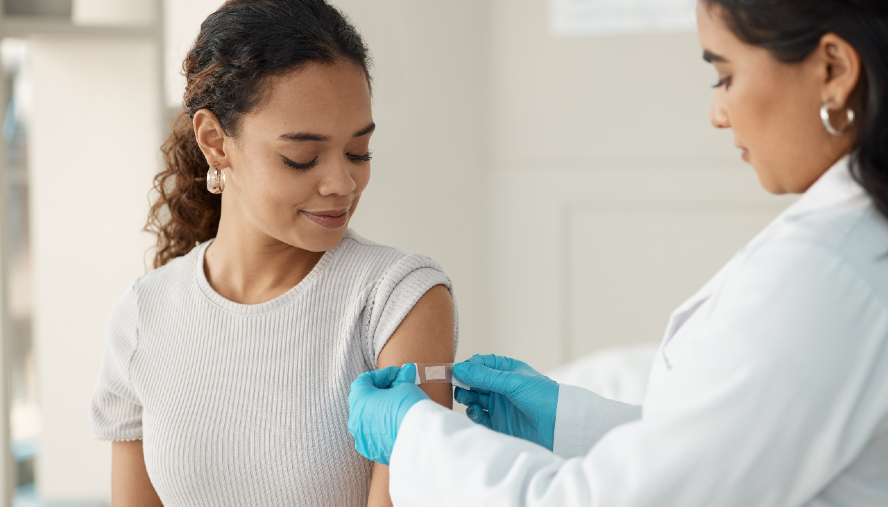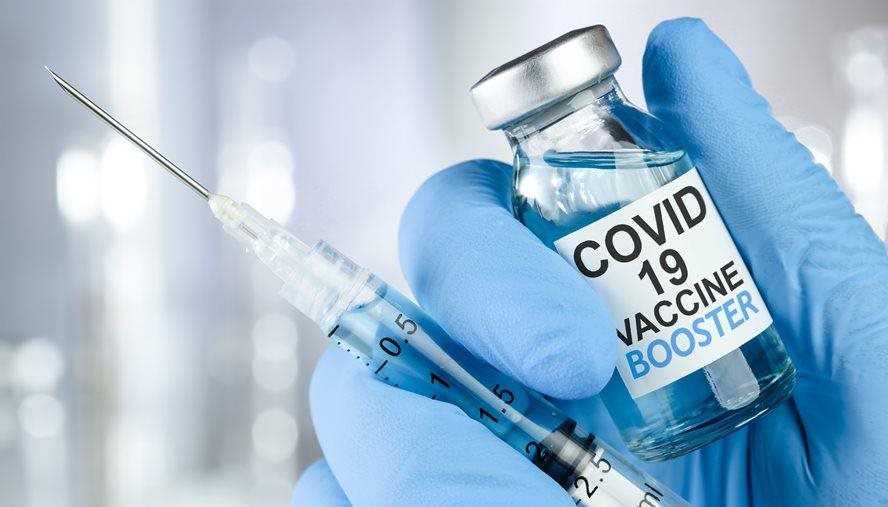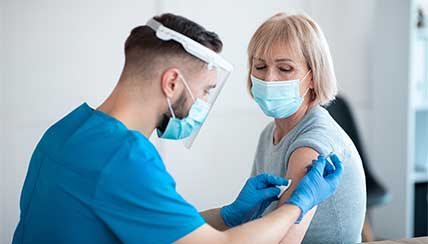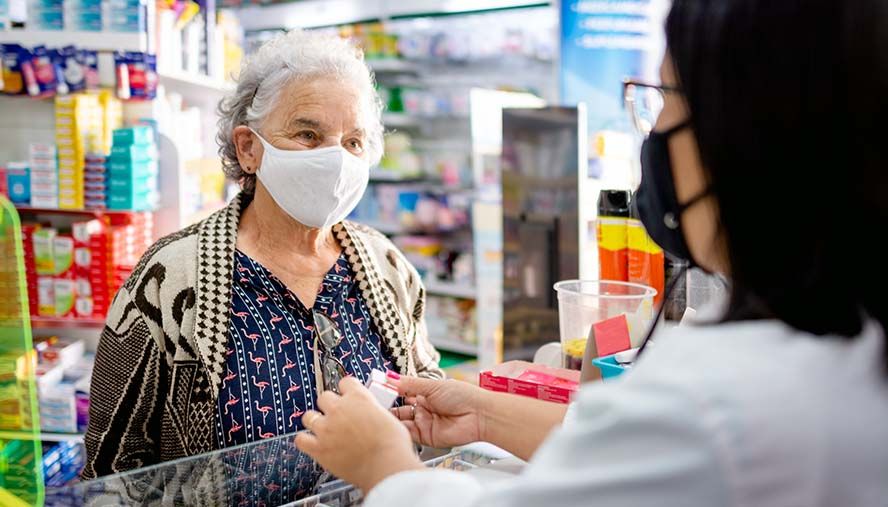Reviewed by: Charles Daley, MD (January 6, 2022)
Coronavirus (COVID-19) Treatments
At the end of 2021, six medications have received emergency use authorization (EUA) from the U.S. Food and Drug Administration specifically for the treatment of COVID-19 and/or prevention of COVID-19 among high-risk people exposed to the coronavirus or people inadequately protected by vaccines. Treatments do not replace the need for vaccination.
COVID-19 Overview | COVID-19 Causes | COVID-19 Symptoms | COVID-19 Prevention | COVID-19 Diagnosis
Antiviral for Non-Hospitalized Patients
On Dec. 30, 2021, the COVID-19 Treatment Guidelines Panel updated their recommendations for treatment of high-risk, non-hospitalized patients with mild to moderate COVID-19. In order of preference, they recommend using one of the following antivirals or monoclonal antibodies: Paxlovid, sotrovimab, remdesivir, then molnupiravir.
COVID Pills (Antivirals)
In December 2021, the FDA authorized emergency use of two new oral treatments for non-hospitalized COVID-19 patients with mild to moderate disease and a high risk of developing severe disease. These pills are the first authorized treatments that can be taken at home as available.
Paxlovid is an oral treatment authorized for use in non-hospitalized patients 12 years of age and older who weigh at least 40 kilograms (about 88 pounds), have mild to moderate COVID-19 and a high risk of developing severe disease. The treatment combines a novel antiviral, a protease inhibitor called nirmatrelvir, and another protease inhibitor, ritonavir, which has long been used to treat HIV. The medication works by blocking an enzyme the virus uses to replicate. Paxlovid pills are taken three at a time twice a day for five days. Treatment should begin within five days of symptom onset.
Molnupiravir is an oral treatment authorized for use in non-hospitalized patients 18 years of age and older with mild to moderate COVID-19 and a high risk of developing severe disease. Molnupiravir is a protein known as a ribonucleoside analog, a fake piece of genetic material that is incorporated into viruses as they replicate, making them non-functional. Molnupiravir pills are taken four at a time twice a day for five days. Molnupiravir treatment should begin within five days of symptom onset.
Monoclonal Antibodies
The FDA has approved four monoclonal antibody medications for the treatment and/or prevention of COVID-19. The monoclonal antibodies authorized for COVID-19 treatment bind to the spike protein that the coronavirus uses to infect cells.
Bamlanivimab plus Etesevimab
A combination of two monoclonal antibodies, bamlanivimab plus estevimab is authorized for treating mild to moderate COVID-19 in adults and pediatric patients, including neonates, with positive COVID-19 test results who are at high risk for progression to severe disease. It is also authorized for post-exposure prophylaxis (preventive therapy) among patients at high risk for the disease who have been exposed to the coronavirus but not yet infected. The treatment is administered as a single infusion in a health care facility. Treatment should begin within ten days of symptom onset. This combination of monoclonal antibodies is not expected to have efficacy against the Omicron variant.
REGEN-COV (casirivimab plus imdevimab)
REGEN-COV, a combination of the monoclonal antibodies casirivimab and imdevimab, is authorized for the treatment of mild to moderate COVID-19 in patients 12 years of age and older who weigh at least 40 kilograms (about 88 pounds) and are at high risk for progression to severe COVID-19. It is also authorized for post-exposure prophylaxis (preventive treatment) among patients at high risk for the disease who have been exposed to the coronavirus but not yet infected. The treatment is administered as a single infusion or subcutaneous injection in a health care facility. This combination of monoclonal antibodies is not expected to have efficacy against the Omicron variant.
As of Jan. 3, 2022, the U.S. Department of Health does not plan to allocate bamlanivimab plus etesevimab or casirivimab plus imdevimab (REGEN-COV) to jurisdictions in regions with greater than 80% prevalence of Omicron based on CDC NOWCAST data, as preliminary data show it is unlikely they will retain activity against the Omicron variant.
Sotrovimab
Sotrovimab is approved for the treatment of mild-to-moderate COVID-19 in patients 12 years of age and older weighing at least 40 kilograms (about 88 pounds) who are at high risk for developing severe disease. This antibody was originally discovered in 2003 from a survivor of SARS, the first coronavirus epidemic disease, which occurred in 2003. It targets a protein shared by the coronavirus that spread in 2003 and the coronavirus that causes COVID-19. Sotrovimab is not authorized for preventive treatment. The treatment is administered as a single infusion in a health care facility. Treatment should begin within 10 days of symptom onset.
Sotrovimab appears to be effective against the Omicron variant but was in extremely short supply at the end of 2021.
EVUSHELD (tixagevimab plus cilgavimab)
Evusheld, a combination treatment of the monoclonal antibodies tixagevimab and cilgavimab, has been approved for pre-exposure prophylaxis (preventive therapy) for patients 12 years of age and older, weighing at least 40 kilograms (about 88 pounds) who do not have SARS-CoV-2 infection, who have not been recently exposed to an individual with SARS-CoV-2 and who have not been adequately protected by vaccines due to weakened immune systems. The medication has been engineered to be long-acting and is expected to be effective for several months. The medication is administered through two consecutive intramuscular injections. Tixagenvimab plus cilgavimab has not been authorized by the FDA in unvaccinated individuals for whom COVID-19 vaccination is recommended.
Antiviral for Hospitalized Patients
Veklury (remdesivir)
The antiviral medication Veklury (remdesivir) inhibits coronavirus replication by prematurely halting the copying of viral genes. It is authorized for the treatment of COVID-19 in hospitalized adult and pediatric patients older than 12 years of age and weighing at least 40 kilograms (about 88 pounds) or patients younger than 12 weighing at least 3.5 kilograms (about 7.7 pounds). Remdesivir is administered via an infusion administered on 3 consecutive days. Treatment should begin within five days of the first symptoms.
To find the latest information on COVID-19 treatments and investigational medications, visit the National Institutes of Health (NIH) website.
Treatment for most people diagnosed with COVID-19 is about relieving symptoms and reducing disease severity. While you have symptoms:
- Wash your hands often with soap and water.
- Stay home from work and school and out of public places so you don’t infect other people.
- Drink plenty of water and other fluids.
- Get extra rest and sleep in a private space, so you don’t infect family members.
- Take over-the-counter medications as needed for fever, headache, congestion, cough and sore throat.
- Gargle with saltwater to relieve a sore throat.
- Eat a bland diet such as bananas, rice, applesauce and toast, if diarrhea is a problem.
- Use a separate bathroom and disinfect surfaces you touch after each use.
- Wear gloves if you must be around other people and animals.
- Cover your mouth with a tissue or your elbow during coughs and sneezes.
- Wear a mask (wash your hands before and after placing a mask on and taking it off).
- Follow your doctor’s advice.
- If you have other health conditions, follow those treatment plans and ask questions if those treatments become challenging.
| The information on our website is medically reviewed and accurate at the time of publication. Due to the changing nature of the COVID-19 pandemic, information may have since changed. CDC.gov and your state’s health department may offer additional guidance. |




